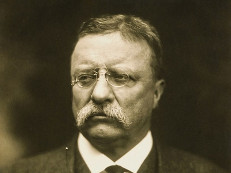With the turn of the twentieth century in Mexico, social forces that had long been oppressed by Porfirio Diaz’s regime saw in his promise for fair elections in 1910, an opportunity to act. What becomes clear, however, is that those emerging social movements are not as homogenous, hierarchically organized nor as experienced in governance as the existing regime. Though these various actors in the Mexican Revolution could agree that something should change, what, and how things should change was far from consensus. Does an increasing political consciousness among peasant and…read more
Posted in Blogs, Week 8 | Tagged with Bolshevik Revolution, globalization, governance, heterogeneity, homogeneity, International socialism, Jose Vasconselo, Mexican Revolution, peasant class, pluralism, Porfirio Díaz, revolution, Rubén Darío, semana tragica, twentieth century, USA Imperialism, Working class
Reading through Rubén Darío’s To Roosevelt (1867-1916) makes it clear the attitude against President Roosevelt and the United States’ actions during his years as president (1901 – 1909). The emotions and the principles addressed by Darío within this poetic article are themes that, unbeknownst at the time, would remain relevant for years to come. Darío contextualizes the hypocratic irony of America having such a progressive leader, for example animal rights or opposition to Tolstoy (L10), Darío goes on to acknowledge Roosevelt’s “cultured” and “skillful” (L10) state. To an extent, Darío uses Roosevelt as synecdochal for the whole of the United States. The mastery in the fight for equality on subjects that directly concern the people’s immediate interest. Rubén Darío describes the United States’ as a “future invader” (L6) of states not void of Indigenous people, in particular, Central America. He further depicts a historically ironic insult that the United States “lack[s] one thing: God” (L51), even though the United States is rich, and is godly in it’s presence, it lacks the relation to God through their natural surroundings which Darío reminds the audience has an expansive and lively history that Euro-United States hasn’t been long involved in which makes Central America superior in the conduct and affairs of it’s proper business.
Posted in Blogs, Week 8 | Tagged with Rubén Darío
Reading through Rubén Darío’s To Roosevelt (1867-1916) makes it clear the attitude against President Roosevelt and the United States’ actions during his years as president (1901 – 1909). The emotions and the principles addressed by Darío within this poetic article are themes that, unbeknownst at the time, would remain relevant for years to come. Darío contextualizes the hypocratic irony of America having such a progressive leader, for example animal rights or opposition to Tolstoy (L10), Darío goes on to acknowledge Roosevelt’s “cultured” and “skillful” (L10) state. To an extent, Darío uses Roosevelt as synecdochal for the whole of the United States. The mastery in the fight for equality on subjects that directly concern the people’s immediate interest. Rubén Darío describes the United States’ as a “future invader” (L6) of states not void of Indigenous people, in particular, Central America. He further depicts a historically ironic insult that the United States “lack[s] one thing: God” (L51), even though the United States is rich, and is godly in it’s presence, it lacks the relation to God through their natural surroundings which Darío reminds the audience has an expansive and lively history that Euro-United States hasn’t been long involved in which makes Central America superior in the conduct and affairs of it’s proper business.
Posted in Blogs | Tagged with blogpost8, Rubén Darío, UBC, week8
Reading through Rubén Darío’s To Roosevelt (1867-1916) makes it clear the attitude against President Roosevelt and the United States’ actions during his years as president (1901 – 1909). The emotions and the principles addressed by Darío within this poetic article are themes that, unbeknownst at the time, would remain relevant for years to come. Darío contextualizes the hypocratic irony of America having such a progressive leader, for example animal rights or opposition to Tolstoy (L10), Darío goes on to acknowledge Roosevelt’s “cultured” and “skillful” (L10) state. To an extent, Darío uses Roosevelt as synecdochal for the whole of the United States. The mastery in the fight for equality on subjects that directly concern the people’s immediate interest. Rubén Darío describes the United States’ as a “future invader” (L6) of states not void of Indigenous people, in particular, Central America. He further depicts a historically ironic insult that the United States “lack[s] one thing: God” (L51), even though the United States is rich, and is godly in it’s presence, it lacks the relation to God through their natural surroundings which Darío reminds the audience has an expansive and lively history that Euro-United States hasn’t been long involved in which makes Central America superior in the conduct and affairs of it’s proper business.
Posted in Blogs, Week 8 | Tagged with Rubén Darío

